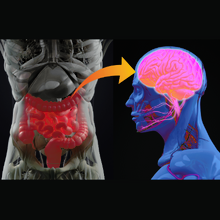First systematic review finds gut-brain axis impacts treatment outcomes in bipolar patients
18 June 2025

- The first systematic review on the effects of bipolar medications on the gut microbiome furthers our understanding of the connection between the gut and the brain in patients treated for bipolar disorder.
- By analysing existing datasets, researchers concluded that the health of the gut microbiome may predict a patient’s response to treatment with drugs.
- The results of the study could pave the way for new personalised therapeutic strategies and inspire further studies and clinical trials focused on treatments with the microbiome in mind.
A new review, published in Microbiology, is the first to systematically review the potential effects of psychotropics (the drugs used to treat bipolar disorder) on the gut microbiome of treated and untreated bipolar individuals.
Bipolar disorder is a mental health condition characterised by unpredictable mood shifts, including episodes of mania and depression. Despite being one of the most common and debilitating mood disorders, affecting over 1% of the worldwide population, bipolar disorder is often misdiagnosed and undertreated.
A significant number of individuals with bipolar disorder do not respond adequately to drugs and previous studies have shown that the gut microbiome, which is the community of microbes and their surrounding environment (the gut), of patients with bipolar disorder are different to healthy individuals. This may be due to the connection between the gut and the brain, known as the gut-brain axis, which is a two-way communication via chemical signals such as neurotransmitters and hormones.
Changes to the composition of the gut microbiome can affect the way that the brain is able to function. It also works the other way, and changes to the brain, like in bipolar disorder, can affect the abundance and composition of the gut microbiome.
Researchers from the University of Alberta, Canada, were interested in reviewing existing data to find out how bipolar medications can affect the gut microbiome, and therefore the brain, and whether the composition of the gut microbiome may change the way a patient responds to treatment.
Researchers collected data from 12 existing studies that analysed the effects of bipolar medications on the gut microbiome. They included studies that looked at differences between the gut microbiome of adults diagnosed with bipolar disorder who were receiving medications and compared them either to before they began taking medication; unmedicated participants; or healthy controls.
The data collected suggests that there is a significant connection between the gut and brain in patients treated for bipolar disorder and that this affects the ways in which a patient responds to treatment.
Patients across multiple studies who responded to treatment (indicated by alleviated depression symptoms) had markedly different gut microbiome populations compared to those who did not respond. In fact, these patients had gut microbiome profiles more alike to healthy individuals. In the future, this may help researchers predict how a patient will respond to treatment.
The gut-brain axis is a complex system which can be affected by multiple factors and further studies are needed to understand the cause and effect between the gut microbiome and the brain.
An Bui, lead author of the study from the Department of Psychiatry at the University of Alberta said, “We don’t know the direction in which this occurs, whether the drugs change the gut microbiome and this changes the way the brain functions, or whether the drugs change the way the brain functions which in turn, affects the gut microbiome”.
Researchers hope that the results of the study could pave the way for new personalised treatment strategies and inspire further studies looking at the molecular mechanisms of these pathways and clinical trials which focus on microbiome targeted treatments.
Dr Andrew Greenshaw, author on the study and Professor of Psychiatry and Neuroscience at the University of Alberta, Canada said:
"The review is important as it brings up more questions and suggestions for future research on how the gut microbiome affects bipolar treatment responses and vice versa. Also, since the research subject is still new, synthesizing such diverse results with heterogeneous experimental methodologies can be helpful in guiding researchers design new studies."
NOTES FOR EDITORS
The paper “Pharmaco-psychiatry and gut microbiome: A systematic review of effects of psychotropic drugs for bipolar disorder” by Truong An Bui, Benjamin R. O’Croinin, Liz Dennett, Ian R. Winship and Andrew Greenshaw is published in Microbiology under the following:
DOI: 10.1099/mic.0.001568
URL: https://www.microbiologyresearch.org/content/journal/micro/10.1099/mic.0.001568
For further information please contact [email protected]
About the Microbiology Society
The Microbiology Society is a membership charity for scientists interested in microbes, their effects and their practical uses. It has a worldwide membership based in universities, industry, hospitals, research institutes, schools, and other organisations. Find out more at microbiologysociety.org.
Microbiology is the Society’s founding journal and the home of high quality research across the breadth of the discipline since 1947. Find out more at: https://www.microbiologyresearch.org/content/journal/micro
For further information please contact [email protected]
Image: iStock/ChrisChrisW.
